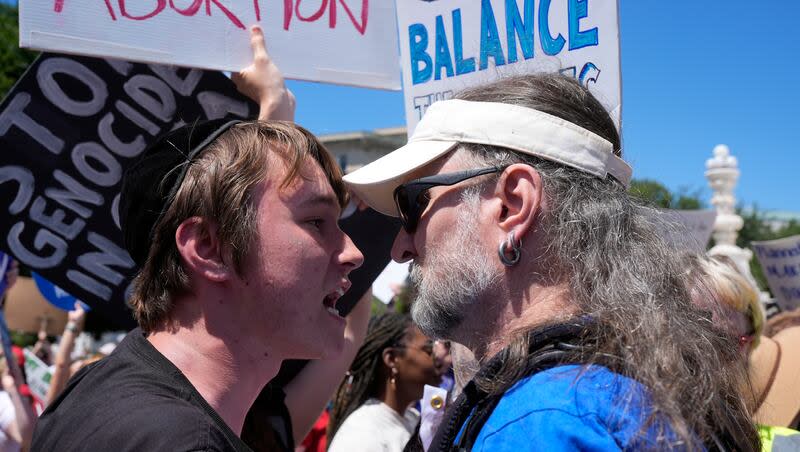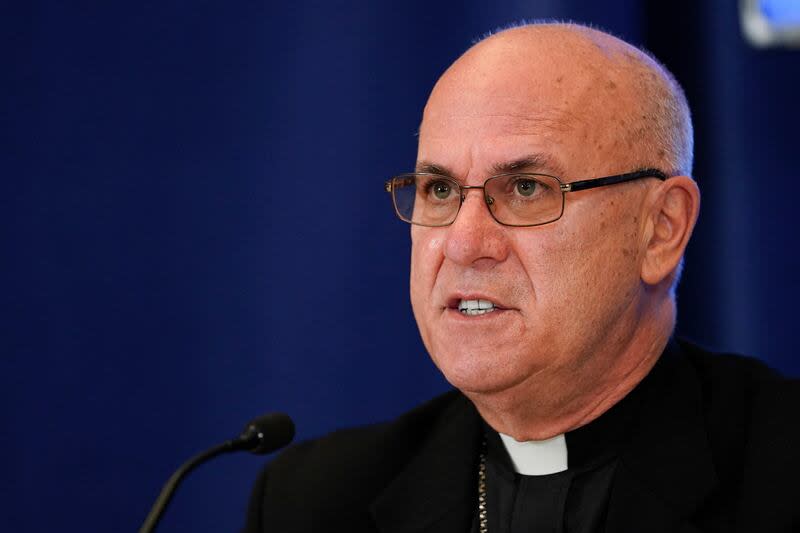The right way to fight about politics

- Oops!Something went wrong.Please try again later.
This article was first published in the State of Faith newsletter. Sign up to receive the newsletter in your inbox each Monday night.
Two days before Saturday’s shooting at a rally for former President Donald Trump prompted a national discussion about political violence, I was at a religious freedom conference reflecting on the issue of polarization — and how it can fuel political violence.
The conference organizers at the University of Notre Dame had no way to know their gathering would be so immediately relevant. But then again, it was already relevant. Even before this weekend’s events, it was clear that the country was losing track of how to civilly disagree.
Bishop Kevin Rhoades, who leads the Catholic Diocese of Fort Wayne-South Bend in Indiana, spoke on that issue Thursday morning, describing the difference between healthy conflict and more toxic disputes.
When politics turns toxic, the Rev. Rhoades said, political opponents aim to do more than win policy debates. They want to crush the other side and to take all the spoils of the war.
A healthier system of politics would still involve plenty of disagreement, he added. But everyone would be focused on creating a better world instead of hurting one another.
In a healthy culture, you could still lose in the sense that your proposed policy doesn’t become law. But you would respect your political sparring partners and truly believe they want what’s best for the country, too.

The Rev. Rhoades said he believes it could be “generations” before we get American politics depolarized and return to the healthy, pluralistic democratic system we’re meant to have.
I was pretty depressed to hear that, but the good news is that we can all start working on depolarization right away.
Here are some steps we can take to reduce political violence and to disagree better, according to the Rev. Rhoades:
Stay focused on what your community needs instead of on why you’re frustrated with your political opponents.
Build relationships with your opponents outside of the context of politics. Get to know them as human beings.
Seek out what’s best for the country as a whole instead of what’s best for you and your political allies.
Build your life around timeless moral values and moral truths, not around fleeting culture wars.
Deseret’s editor, Sarah Jane Weaver, was with me at the Notre Dame conference. Read her coverage to learn more about how to combat polarization.
The case for religious liberty hinges on restoring ‘faith in faith’
What one Latter-day Saint leader learned after California’s Proposition 8 about peacemaking
Fresh off the press
Political and religious leaders call for prayers for Trump and the country after shooting
Why some Christians cheered the recent layoffs at the Southern Poverty Law Center
Why Nick Saban said sports is like a religion
British celebrities are speaking out in favor of a controversial form of worship
A minor league baseball game just ended with a public baptism
Term of the week: The Rev. Pounds
Beloved fitness instructor Richard Simmons died over the weekend at age 76. He’s being remembered for his silly and and yet inspiring workout programming, in which he portrayed a number of memorable characters, including the Rev. Pounds.
The Rev. Pounds was “a man of the cloth — the tablecloth” who said things like “Though I waddle through the valley of linguine and clams, I shall fear no evil,” according to The New York Times.
Simmons’ team tweeted about his portrayal of the Rev. Pounds just last month.
“I loved playing Reverend Pounds. I stood behind a pulpit with a stained glass window in the back. I talked about the evils of certain foods. I wore a white wig, white tuxedo, holding a pair of white gloves with a holy book in my hand,” the post said.
What I’m reading...
Many Christian leaders took to social media after Saturday’s shooting at a Trump rally to call for prayers for the former president. Then, many of the same people gathered together on a phone call to thank God for keeping Trump safe, according to Christianity Today.
A source close to Trump told The Washington Post that the former president is feeling spiritual after the shooting. “He thinks he was handed a gift from God. He can’t believe it,” the source said.
Earlier this month, I wrote about efforts to incorporate religious texts into public school curricula, including a new law requiring the Ten Commandments to be displayed in Louisiana classrooms. In response to the same trends I covered, The Conversation published a helpful analysis on what the Supreme Court has said in the past about studying the Bible in public schools.
Odds and ends
If you, like me, are in need of something to lift your mood (or serve as a happy distraction) during this difficult news cycle, check out “Barbecue Showdown” on Netflix. It is a cooking competition show with an incredible amount of heart (and heat!).
The Olympics are about 10 days away. Let me know if there are any religion angles you’d like me to cover.

